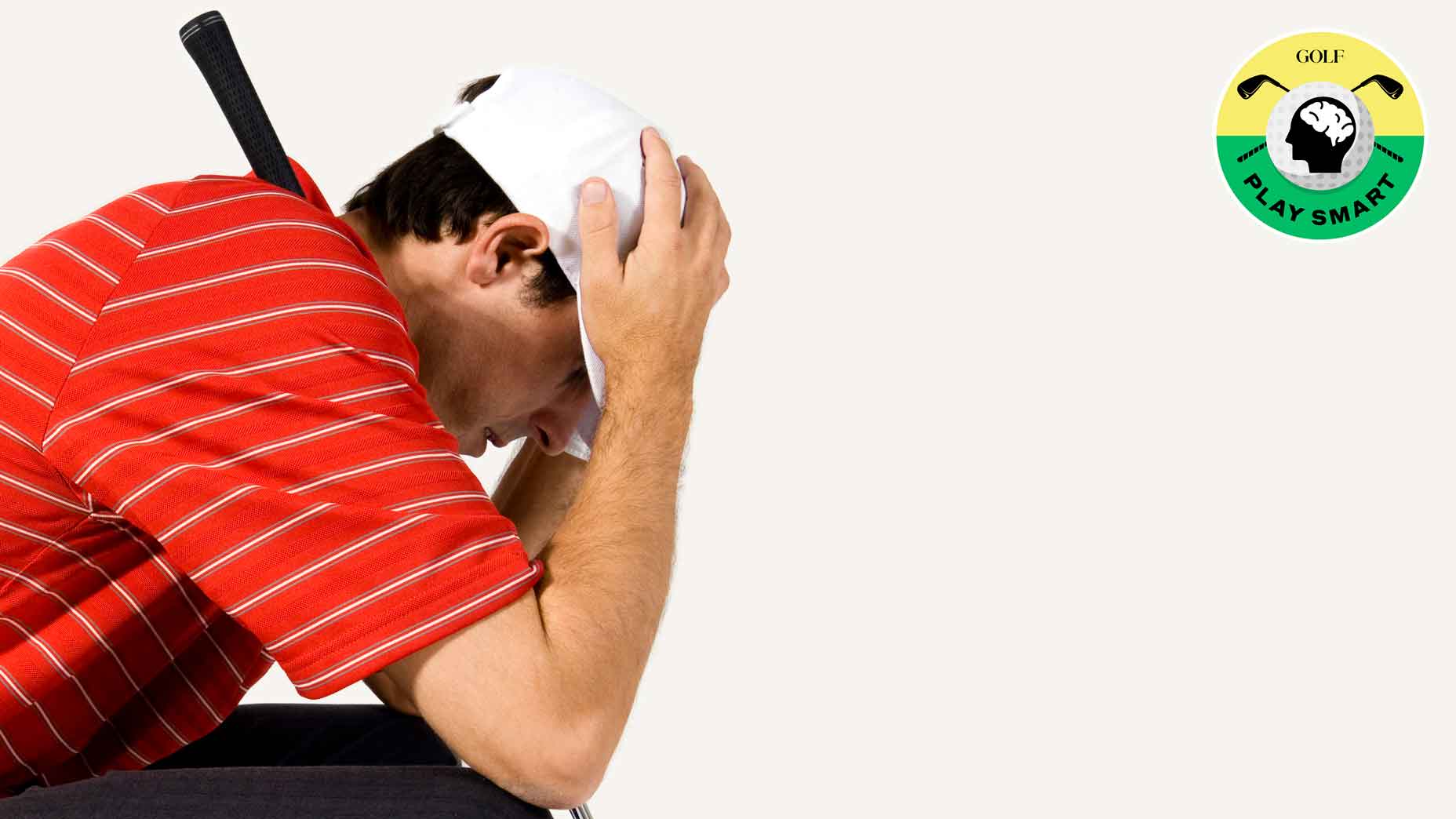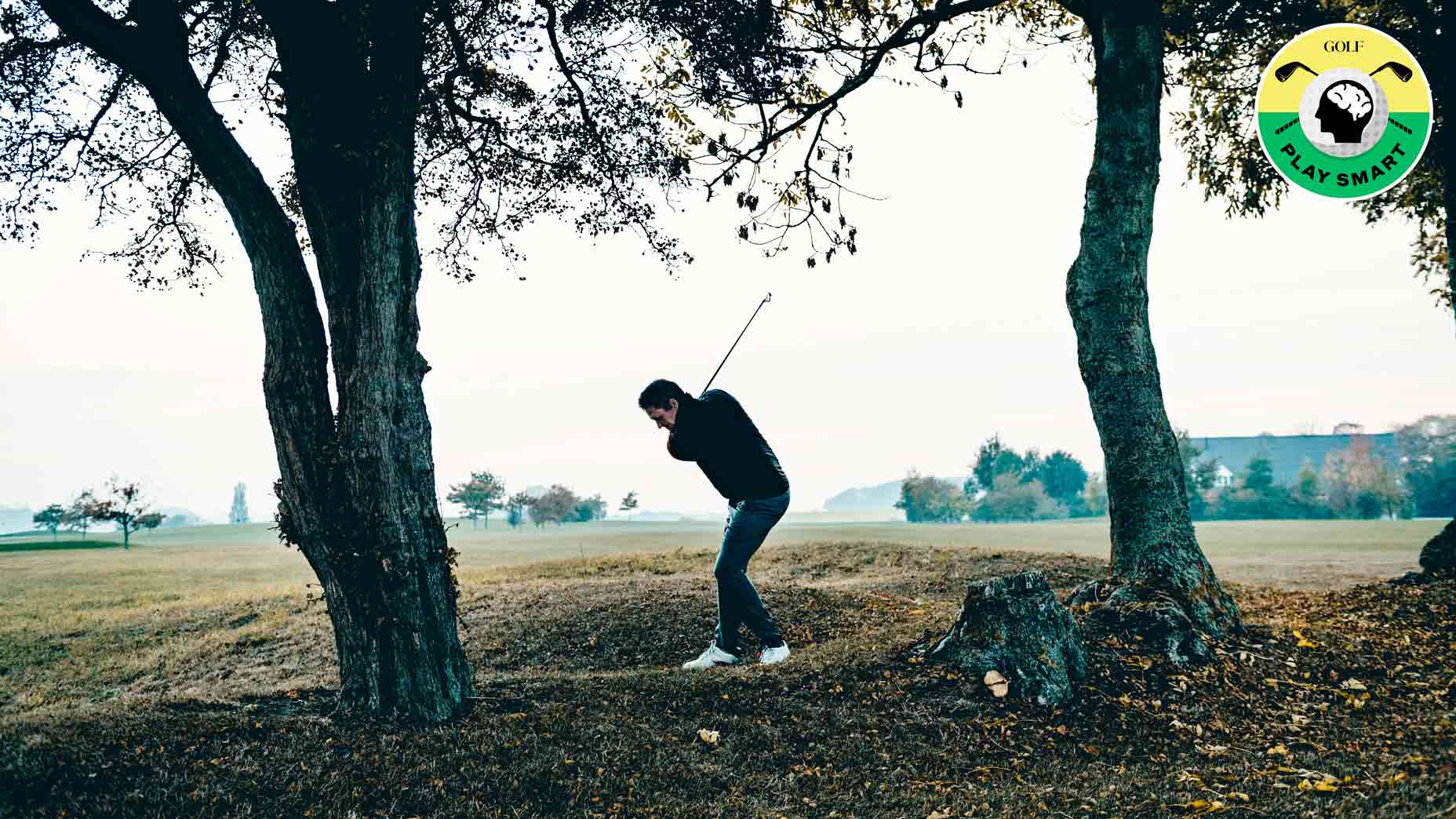The young golfer was worried. 4 tips to help dial in his game

Top 100 Golf Instructor John Dunigan shares how he helped a high school golfer overcome his golf anxiety.
Photo by John Dunigan
Welcome to Shaving Strokes, the GOLF.com series where we share the progress, lessons learned and takeaways from novice golfers like you — including the speed bumps and challenges they've faced along the way.
If there is one thing that every golfer experiences, it is some form of golf anxiety.
But unlike working on fixing a piece or learning how to stop shooting wedges for hours on the range, the mental aspect of the game can eat you up and lead you down a dark path. Those first two problems are very treatable – and usually won't cause a person to stop playing golf for a living.
There are many stories about pro players who have lost their mojo due to mental problems. Whether it was the pressure to keep their PGA Tour card, or just being caught up in the anxiety of performing and being judged by others, there are certainly different levels of anxiety in golf.
Every golfer expects to play well and hit low shots each time they play. Unfortunately, that's not how golf works (unless your name is Scottie Scheffler), so understanding how to control your emotions and stick to a plan when things go wrong is the big difference between good, bad, and good players.
Top Golf Instructor John Dunigan recently shared an example with me.
Dunigan works with all levels of players, and one of his current students is a high school girl who was hoping to make her school's golf team — and had some trepidation leading up to the tryout.
Although he had the physical skills to compete and earn his spot, Dunigan needed to restart his mental game, giving him tips on how to manage his golf anxiety and play his best no matter the conditions. Below, Dunigan shares four tricks he's used to help his student — which are easy exercises to use the next time you're distracted on the golf course.
True Spec Fitting
With over 50,000 clubhead and shaft combinations, True Spec Golf will custom fit and hand build you the most finely crafted, most accurate set of golf clubs you've ever played.
4 tricks this high school golfer used to manage his golf anxiety
During a recent session with one of my students, I noticed how upset my student was as we worked together. Tryouts for his high school team were coming up the next day, and he had all kinds of golf worries and nerves. Like, indeed great senses.
Her discomfort was obvious, and as we discussed what was happening, she came up to me and started crying on my shoulder. It hurts, yes, but it's also part of the job as a golf instructor.
This little girl's mental game was a mess, and we needed to work on strengthening it to overcome any emotions in order to play at our best – especially with the first round of golf the next day.
As I comforted him, I gave him the following four tips that can help any player in those difficult times.
Organize your senses as pleasure
After clearing his mind and taking a deep breath, we talked about how emotion (or what I like to call excitement) is your brain's way of preparing for action. Your mind is just helping you pay attention – so sensations are good, if not essential, and should be embraced rather than avoided.
That's when I gave him my roller coaster analogy.
Why do people like roller coasters? They are fun, fast, fun, and can be a little scary. Well, that's golf – a roller coaster, so get on it!
Like riding a roller coaster at an amusement park, golfers need to subdue their senses and focus on what they can control. In this case, it's about the image you shoot, and the steps you can go through to prepare for a good result. Often times, this involves using helpful self-talk to get ourselves in the right frame of mind, which helps us relax before talking to the ball.
Embrace opportunities
I hate to break it to you, but you don't really control the outcome of golf. Sure, you can go through your shooting process and try to handle things as best you can, but what happens after that is out of your hands.
I had to remind this student of mine, telling him how he can play well today, but tomorrow he will struggle. You just have to accept this as a reality, as it is the nature of the game.
Sure, you have control over the outcome or a particular shot, but you don't have complete control over it. Accept that and just try your best.
This is where I told him about the power of possibility.
Today may not go your way, but it may go your way! If you focus on your process and play each shot, that means you're giving your best effort and focusing on that moment – not on a bad shot or a poor score on the previous hole.
Every hole offers a new set of possibilities, no matter how you play that day. You can't control the outcome, but you can control how you think and play as best you can. So put away your score card and don't worry about missing a shot. Just embrace the opportunity.
Avoid travel time
Time for golfers is always on the move, and we focus on the final score three hours from now, or the three putts that took place 10 minutes ago. I had to remind this lady not to be a stranger on time.
The only thing that matters is the here and now: the shot you're about to hit. That shot deserves your best effort and your full attention, right? Let go of your attachment to results and give each shot the focus it needs.
Use breathing exercises
I have studied sports psychology for over 40 years, and one common theme is how we must use breathing exercises to our advantage.
I gave my student a simple way to use it before the shot (whether he showed golf anxiety or not). First, breathe for a count of 4 and press the club firmly, tightening as many muscles in your body as possible. Next, breathe for a count of 6 and release that tension. Repeat if necessary. Finally, go hit your shot with your best effort.
Most beginner golfers stiffen under pressure. But by using this simple breathing method before shooting, you can relax your nerves significantly.
So what happened?
I texted him after the first round of 9 practice holes and could hear the excitement in the text as he replied— “A 41!”
I didn't hear anything after the second day, but I followed up on the third and final day of the tryout, as he called to tell me that he shot 40 and successfully earned his spot on the team. He was happy, like me.
He told me: “I was worried all week. “But I went through the process that gave me each time and ended up playing well.”
It was music to my ears, and I'm glad he found a way to channel his golfing concerns to do his best. So when you are facing a similar battle within, I hope these mental tips will allow you to reframe and use your emotions to focus your attention properly.
Voice Caddy VC4 Golf GPS
$129.99
The VC4 is a smart GPS rangefinder that not only tells you the distance to the center of the green, but also provides elevation changes, distance to front and back, and locates the ball and gives you carry distance. It is equipped with a high battery that can last up to 54 holes. When the battery is low, it counts the remaining slots and automatically goes into Power Saving mode. Fast charging is available with the included USB-C charger.
View Product
Source link









